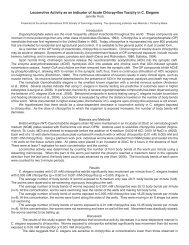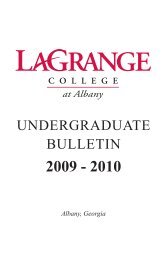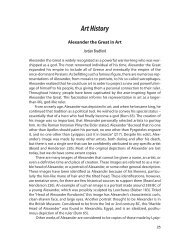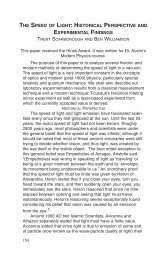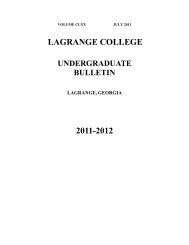Works of Mercy as a Vital Component to Sanctification - LaGrange ...
Works of Mercy as a Vital Component to Sanctification - LaGrange ...
Works of Mercy as a Vital Component to Sanctification - LaGrange ...
You also want an ePaper? Increase the reach of your titles
YUMPU automatically turns print PDFs into web optimized ePapers that Google loves.
Ryan Snider<br />
gradual, problems came his way. In answer <strong>to</strong> the question,<br />
Wesley maintains that it is both gradual and instantaneous; it is<br />
gradual in the sense that one is growing in grace from the<br />
moment one is justified, while also instantaneous, <strong>as</strong> there must<br />
be a moment before death in which sin no longer exists. 37 A<br />
possible inconsistency arises here, <strong>as</strong> Wesley is in danger <strong>of</strong><br />
confirming what he w<strong>as</strong> condemning, that is, predestination. If<br />
sin is a substance that is removed by an act <strong>of</strong> divine grace, it<br />
follows that some are chosen and some are not. 38 Although<br />
there is an inconsistency with Wesley’s thought in this area, it<br />
only arises when Wesley’s message is unders<strong>to</strong>od out <strong>of</strong> context.<br />
Wesley never intended <strong>to</strong> deal with sinless perfection, but<br />
with perfection <strong>of</strong> love.<br />
In conclusion, the heart <strong>of</strong> Wesley’s message is what is<br />
important. Wesley’s message does not focus on sinless perfection<br />
but on what he actually preached and practiced, which is<br />
love. Moreover, the teleological element is also important—the<br />
idea that love plays a role in defeating sin in the present life and<br />
in “being res<strong>to</strong>red <strong>to</strong> the image <strong>of</strong> God.” 39 An endorsement <strong>of</strong><br />
perfection <strong>of</strong> faith rather than love forces one <strong>to</strong> be less socially<br />
minded. A Wesleyan emph<strong>as</strong>is on perfection <strong>of</strong> love allows<br />
works <strong>of</strong> mercy <strong>to</strong> play a defining role in sanctification. This<br />
focus on love becomes <strong>of</strong> paramount importance through<br />
Wesley’s focus on love <strong>of</strong> God and neighbor <strong>as</strong> the primary rule<br />
<strong>of</strong> living. It is in this sense that one can begin <strong>to</strong> understand<br />
how love produces the good works that will play a crucial part in<br />
defeating sin and in becoming res<strong>to</strong>red <strong>to</strong> the image in which we<br />
were made.<br />
ATTAINING HOLINESS THROUGH WORKS OF MERCY<br />
Holiness by Imitating Christ<br />
Once Wesley’s via salutis is gr<strong>as</strong>ped, one can begin <strong>to</strong><br />
understand the rationale behind Wesley’s social ministry.<br />
Foremost, drawing from an Anglican influence, Wesley held high<br />
regard for the life that Christ lived and for the importance <strong>of</strong><br />
striving after a similar lifestyle <strong>as</strong> a re<strong>as</strong>on for social responsibility.<br />
For instance, Jeremy Taylor insisted that Christian perfection<br />
requires “Christlikeness in human soul and character…<strong>to</strong> be<br />
holy like him or in imitation <strong>of</strong> him.” 40 Wesley similarly perceives<br />
holiness <strong>as</strong> resulting from the endeavor <strong>to</strong> live <strong>as</strong> Christ<br />
did. Furthermore, the venture <strong>to</strong> imitate Christ led Wesley <strong>to</strong><br />
deduce several other important values. These are the ideals <strong>of</strong><br />
167








